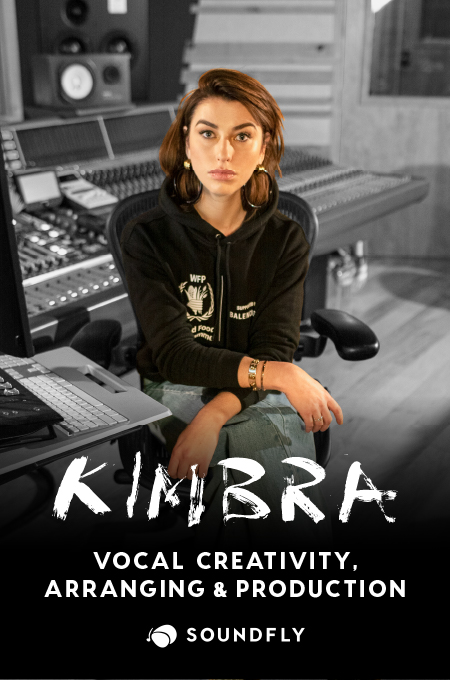+ Our brand new course with The Dillinger Escape Plan’s Ben Weinman teaches how to make a living in music without making sacrifices. Check out The Business of Uncompromising Art, out now exclusively on Soundfly.
Spearheading your own PR campaign is no easy task. Putting the necessary tools in place requires a lot of grit, determination, and old fashioned time and effort. I won’t lie and say it will be easy or that it’s something you can learn in a few weeks. This is something that takes months to really perfect if you dive in wholeheartedly and longer if you only commit a few hours a week to it.
In truth, it took me years of networking to build the database and relationships I have today that support my own PR company. But if you can master these tricks of the trade, you’ll be able to save yourself a lot of time and money in the long run. You’ll also build up a strong network of relationships to serve you throughout your career.

This is, by far, the most important piece of the puzzle and, without a doubt, the foundation you’ll need. Relationships are everything in the music industry and in public relations, especially. People may love your music, but if they aren’t invested in who you are as a person, you’ve cut your odds of anyone paying attention in half (at least).
The most important thing you can do for yourself is commit to building and maintaining relationships with the people around you. In time, this will become more natural. You’ll meet new contacts through old ones, introduce people to each other, and the whole process will feel more organic. But, before that, you’ll need to do a lot of “cold calling” to set things in motion. Don’t worry, this isn’t actually as scary as textbook cold calling. In fact, building relationships in the industry is really just about creating conversation.
Before we get started, I want to emphasize the importance of genuine interest and commitment. No one likes a faker, and if you go into this feigning your way through conversations, itching to talk about yourself instead of other people, and shooting straight to the top of the music-industry food chain while ignoring all the “little people” on the ground level, you’re going to be in for major disappointment.
While I always encourage dreaming and goals, it’s unrealistic to expect that you’re going to go from not networking at all to trying to schmooze the A&R guy at a major label you love or getting on the good side of every editor at Pitchfork, Stereogum, and Consequence of Sound.
You have to take time to build up these relationships and trust that they’ll lead you where you want to go eventually. You’re more likely to be introduced to that editor or manager through a trusted friend, so spread your wings and meet as many people as possible. Just don’t overlook those at the early stages of their careers just like you. I promise, they’ll be the most loyal throughout your career and eventually be able to introduce you to the power players you crave knowing. And you’ll be able to do the same for them, which will only make those relationships stronger.
+ Read more on Flypaper: “How to Conquer Your Self-Promotion Phobia”
Get to Know the Person, Not the Work
This is one of my most cherished pieces of advice. When someone I’ve only just met emails me or finds me at a conference and wants to talk PR, I’m flattered and happy to help out where I can. But when someone comes up to me and mentions that, while checking out my Instagram, he or she saw how cute my dog is and starts asking about him, I’m going to be really excited to talk for hours!
In the age of social media, there’s really no excuse for not knowing a person’s interests. Just be careful not to tread into creeper territory with a depth of personal information only a stalker would know.
Without a doubt, the strongest relationships I’ve built throughout my career over the last eight years have been due to conversations that had absolutely nothing to do with music or the industry. Sometimes it’s as simple as two dog lovers gushing over their pets. Other times, it’s after commenting on a social media post asking for advice or expressing concern. It’s those little things that may even feel slightly out of place that end up creating the most lasting bonds.

Like any friendship, your networking relationships require continual check-ins and maintenance. Try not to put too much pressure on them. You want to let your contacts know you care, that you’re interested in them (and that means letting them do most of the talking and never, ever pushing your music on them like a rabid salesperson), but you also don’t want to suffocate them.
How to Find and Make Connections
I really believe that the strongest connections are made offline at events like shows, conferences, and in-person industry meet-ups. Seeing the same people in your community week after week or even once a month creates a strong bond that simply can’t exist in the same way online. Attend smaller industry conferences where you can (which often come with a cheaper price tag).
Get out and join the meet-ups that may exist in your community. Check out Balanced Breakfast, a music industry meet-up that meets in more than 12 cities across North America. The more you get out to shows and meet people in your community, the more local meet-ups you’re bound to hear about. And, if you can’t find any, start your own!
When it comes to finding connections via the internet, the most obvious place to turn is, of course, social media, where the power of the crowd is your strongest asset! Sure, there’s Twitter, and that’s a great platform for getting to know people in 140 characters or less, but in my opinion, Facebook groups offer the most bang for your networking buck.
There are a lot of dodgy ones out there, with nothing but spam posts and tumbleweeds blowing through, but there are also a lot of really high-quality groups to join. You’re likely to come across many of them via word of mouth, but to get you started, check out three of my favorites:
- Music Launch Hub is easily one of the best groups in terms of access to a truly supportive community and as a place to meet other songwriters from around the world and ask any questions you have about the industry.
- Defend Pop Punk if you’re into that kind of music and community.
- Music Biz Besties for the ladies out there!
Keep in mind that with any and all of these groups, you want to follow a similar approach to the point above. That means not just posting links to your music and saying, “Please listen/buy/subscribe/follow.” Take the time to get to know a few people in the group, respond to their questions, and offer advice where you can. Make yourself available as a resource rather than just asking for help when it suits you and never contributing otherwise. When it’s time for you to promote your project, you’ll have a supportive community around you willing and interested to learn more!

Once you’re confident that you’ve built a strong pool of relationships, it’s time to start crafting your pitch. This can be tricky as submission guidelines vary per site, which is why it’s so important to make sure you’re tailoring your pitches individually.
Make It Personal
Whenever you can, make sure you’re emailing an actual person rather than the site’s info or submissions address (i.e., [email protected]). Those addresses get flooded with hundreds of emails a day, so it always makes sense to try and contact an actual person.
Sometimes, individual email addresses are listed right on the website. Other times, you may have to dig a little deeper. This could mean trying to first build a relationship with someone outside the site (like on social media) and then asking for his or her email. It may also mean asking your friends or other bands you know and respect to connect you.
Here are a few other tips on writing and sending out press releases to journalists, courtesy of our free Touring on a Shoestring course, which teaches artists not only how to book a successful DIY tour, but how to promote and manage one as well:
Keep It Short, but Sweet
For the most part, you’ll want to keep this email short and sweet, but again, always check guidelines to make sure you’re adhering to the blog’s wishes.
Now, here’s the big one: to personalize your emails. This is the hallmark of my company, Muddy Paw PR, and it comes from eight-plus years as a blog owner. Generic emails from people you know that don’t include all the info get ignored, while well-thought-out, personalized emails get read, even if the blog doesn’t always respond.
It all starts with a well-crafted subject line. Including the person’s or blog’s name adds a sense of personalization and lets them know it’s just for them. Be sure to also include your band’s name and, if it’s not getting too lengthy, your “recommended if you like” (RIYL), a.k.a., who you actually sound like. This helps a blog distinguish right away if your music is a fit and which writer may cover you.
Don’t worry about alienating people. If you really do sound like those artists, then it doesn’t matter if the blog chucks your message because it’s not their thing. The result is the same if you don’t tell them, they listen, and your sound isn’t their thing. The only difference is that by including a RIYL, you have a higher chance of grabbing the attention of someone who does really like those artists.
Always start with the name of the person you’re contacting in the body of the email. If it’s a “cold call,” a compliment to let this person know you’re a fan of his or her work won’t hurt. “Hey” isn’t good enough, but, “Hey Elsie, I’m a big fan of your article on X, because YZ” is.
Whatever you do, be sure to spell everything correctly! The goal of the email is to make it clear that you’ve done your research on his or her blog and have been paying attention to what’s published there. This isn’t a copy-and-paste job and shouldn’t feel like one.
As for content, keep it short and to the point. Include your band name, RIYL, where you’re from, what it is you’re releasing, and what you’re looking for. If it’s an album review you want, tell them about the album and process of recording it. If you want an interview, ask for it. Be as clear as possible so there’s no guesswork.
Also include links to your music, bio, social media, and hi-res promo photos. These could be on your website, SoundCloud, or preferably on a private EPK page of your website that houses everything. Where they should not be is attached to the email. No one likes getting MP3 attachments (virus alert!) or heavy photos that take forever to download.
Don’t Forget to Follow Up
Because blog editors and writers are busy, sometimes they need reminding. Anywhere from a few days to a week later is usually suitable to circle back, but following up more than twice after the initial email is probably pushing it. They might miss your email once or twice, but after that, take the hint that they probably just weren’t interested this time around.

Congratulations! First, take a moment to pat yourself on the back and celebrate a little. This is very exciting! When you receive interest from a blog, respond as promptly as possible, and get the writer all assets within the time frame in which they’re needed. If he or she sends you interview questions, even if there’s no deadline, don’t wait two weeks to send them back. It creates a kink in that person’s planning and, honestly, just seems sort of ungrateful.
Before you send anything back, make sure you proofread it, especially if it’s something like an interview or guest blog. The writer is covering you for free because he or she loves your music, so don’t punish that person by forcing him or her to edit all of your spelling errors or wait days or weeks to get an email back.
Once the coverage is published, share it on all your socials, preferably more than once, and tag the outlet. This is a step a lot of bands miss for no good reason. Besides loving your music, access to your audience is a big part of why a blog covers you, so the least you can do is share and tag the outlet so your friends and fans know where to find them.
Tagging also alerts the outlet that you’ve shared the coverage. Don’t forget, re-tweeting is great, but craft your own unique post thanking the outlet as well. Trust me, this all goes back to point number one: relationship building.
Lastly, don’t forget to save your press clippings. They’ll come in handy on your press page, where you can offer press quotes and links to the article, as well as reaching back out during your next big release. You’ve made it this far, so don’t get disorganized now.
And there you have the basics of running your own music PR campaign. There’s no doubt that it’s a lot of hard work, long hours, and constant focus, but if you can master the art of your own DIY campaign, you’ll always know your releases are in good hands. While publicists like myself love and adore our clients, and work hard for them, you’ll always be your own number-one fan. If you ever have any questions, feel free to reach out! I’m always happy to talk about PR — or my dog — any time.
Want to get all of Soundfly’s premium online courses for a low monthly cost?
Subscribe to get unlimited access to all of our course content, an invitation to join our members-only Slack community forum, exclusive perks from partner brands, and massive discounts on personalized mentor sessions for guided learning. Learn what you want, whenever you want, with total freedom.




